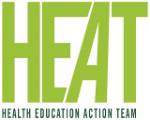Health Promotion Services
USF H.E.A.T.
H.E.A.T. is an acronym that stands for Health Education Action Team. USF H.E.A.T. peer educators are dedicated to increasing awareness and educating fellow USF students on health and wellness. We have teams at USF St. Petersburg and USF Tampa. Stay up to date with the latest workshops, presentations, and events through BullsConnect!
Why join?
By becoming a part of the H.E.A.T., you will:
- Learn important foundational leadership skills, like public speaking, group facilitation, teamwork, program development, and more
- Gain experience working with and educating a diverse student body on a variety of important college health issues
- Cultivate your own personal development and self-awareness.
H.E.A.T. Members vs. H.E.A.T. Leaders
As a Member, you:
- Are a student leader on campus
- Network with other students who share interest in health and wellness
- Serve as a trusted resource for peers
- Attend all meetings and events deemed mandatory by officers and/or advisor
- Become familiar with the intricacies of planning and facilitating campus-wide events
- Understand Wellness Center services and resources
As a Leader, you:
- Learn about different college health issues
- Become comfortable discussing sensitive topics with peers
- Plan and facilitate programs and events
- Improve public speaking skills
- Learn how to effectively communicate
- Build your resume with a host of leadership skills and trainings
- Raise awareness on campus
- Organize, implement, and evaluate at least one event/program per semester
- Present/participate in a minimum of 2 additional events per semester
Our Mission & Vision
Mission: As a diverse student run leadership organization, we are committed to creating a healthy USF St. Petersburg campus culture by raising awareness, providing engaging education and promoting personal growth.
Vision: A healthy campus culture in which students feel comfortable and empowered in making decisions that contribute to their physical, mental, environmental, and social well-being.
Knowing that we cannot achieve perfection, we continually educate ourselves on healthy practices and lifestyle choices in order to be effective role-models both on and off campus.
As a BACCHUS Nationally Certified Peer Educator (CPE), we assist the Wellness Center in providing workshops and trainings to students on how to make healthy and safe decisions that are common across college campuses. Topics may include: alcohol, tobacco, and other drugs; sexual health; sexual violence; mental health; nutrition; and other health topics relevant to college students.
How can I join the USF H.E.A.T.?
To join as a member simply join our group on BullsConnect! Currently applications to be a leader are closed, when reopened in Spring 2025 please complete the USF H.E.A.T. application. For more information and questions, please email the Assistant Director of Health Promotion Services or call (727) 873-4422.
USF H.E.A.T. Training
USF H.E.A.T. leaders act as peer educators and are required to participate in a comprehensive training. Which includes foundational leadership training developed by the BACCHUS Network as well as general health content training on a variety of college health issues. Students who successfully complete the trainings will become Certified Peer Educators (CPE), an indication that they have been trained in skills that make them a better leader, educator, role model, activist and friend.
Training takes place the week before fall semester and includes 2 days of BACCHUS CPE training and 3 days of intensive health content training.
All of USF H.E.A.T. receives continuing education throughout the year in order to keep them up to date with referral skills, how to help victims of assault, how to help fellow students with mental health concerns, and more!
BACCHUS (a NASPA Initiative)
The BACCHUS Network is a university and community based network focusing on health and safety initiatives. BACCHUS is a non-profit organization which actively promotes student based, campus and community leadership and programming on healthy lifestyle decisions. Their training consists of the following topics:
- Strategies for change
- Listening Skills
- Responding & Referral Skills
- Intervention Skills
- Developing inclusive peer education efforts
- Programming & presentation skills
- Self-Care
- Group development and success
